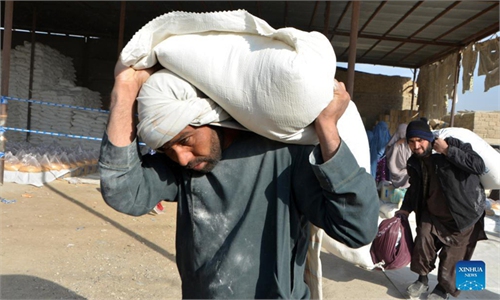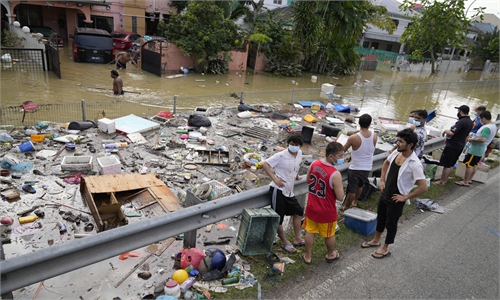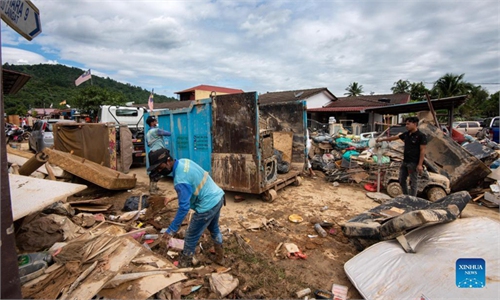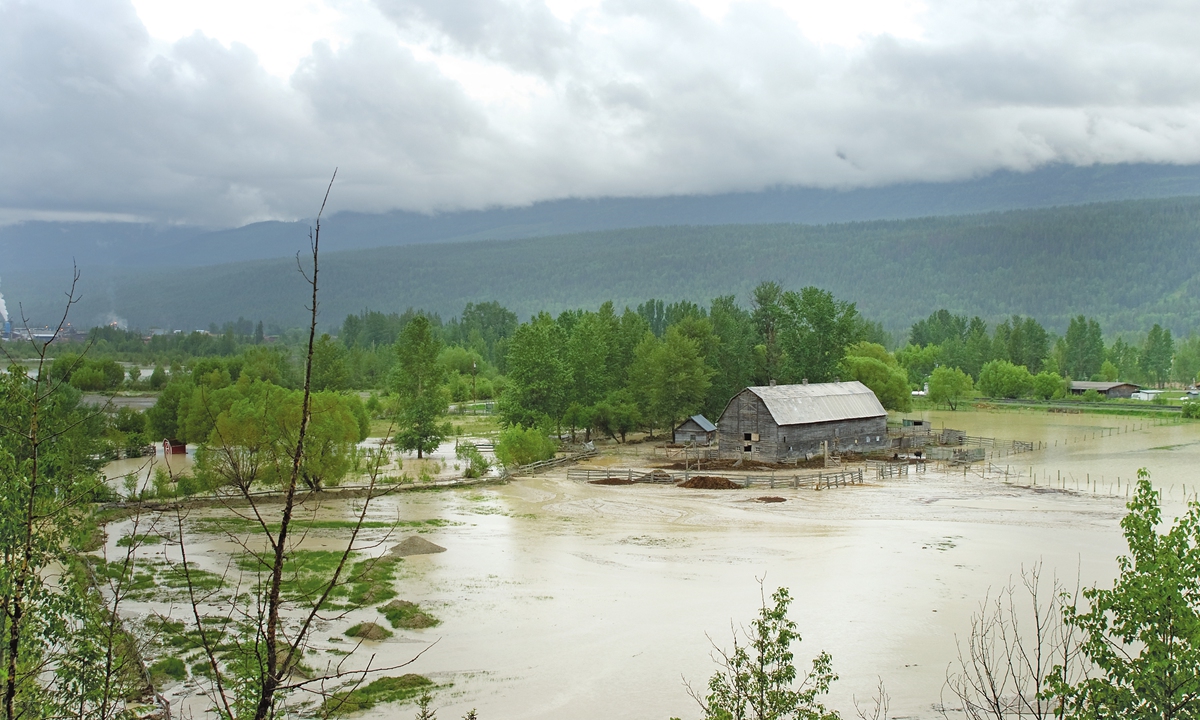
Flooded farmland on the Columbia River, British Columbia, Canada Photo: VCG
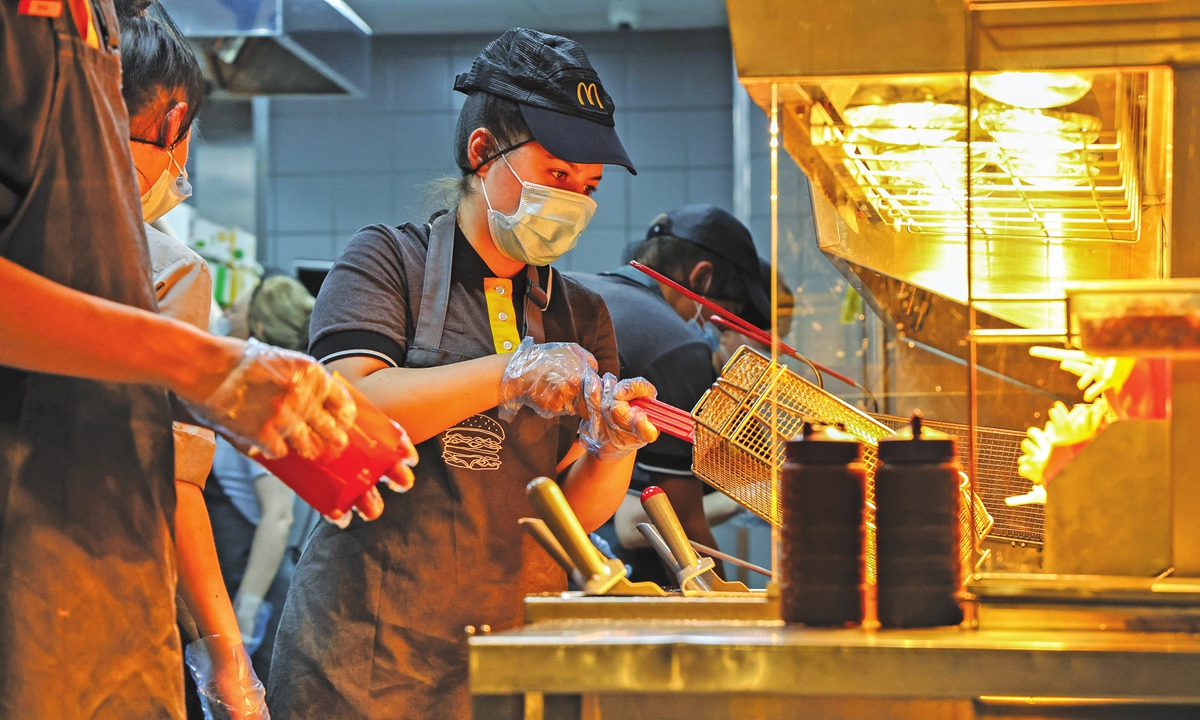
A worker cooks french fries in the kitchen inside a McDonald's restaurant in Moscow, Russia, on June 30, 2021. Photo: VCG
A mix of drought in Canada's prairies and flooding on its Pacific coast have brought about crop production and shipping woes now leading to international shortages of fries and mustard.
In Japan, for example, McDonald's has been forced to ration fries as the British Columbia floods squeezed potato imports, while mustard producers in France are forecasting steep price increases because the drought in another part of Canada, the world's biggest producer of mustard grains, cut supplies.
"When we look back at the state of the agriculture sector in 2021, we can say this year has been marked by extreme climate change weather events," Agriculture Minister Marie-Claude Bibeau said in a recent speech.
"That includes the worst drought in 60 years in Western Canada and the devastating atmospheric rivers in British Columbia," she told livestock farmers and ranchers who have struggled to secure enough hay to feed their animals as pastures dried up.
According to government data, farmers in Canada produced more corn but less wheat, canola, barley, soybeans, and oats in 2021 compared with 2020.
The lower yields, which Statistics Canada said marked the largest year-over-year decrease on record, falling to levels not seen in more than a decade, were driven largely by drought conditions in Western Canada.
Keith Currie of the Canadian Federation of Agriculture told AFP: "There's a lot of angst in the farming community."
Some farmers have lost everything, others are considering quitting as the future looks bleak.
The Agri-Food Analytics Labs at Dalhousie University publishes a list of the top 10 food-related stories each year. Climate calamities in Western Canada ranked second in 2021, after food inflation.
"Climate change has strongly impacted agricultural production and supply chains" already strained by the pandemic, its scientific director Sylvain Charlebois told AFP, leading to rising food costs.
"This year [2021] saw extremes," he said, noting a Canadian record high temperature of 49.6 C in the town of Lytton in British Columbia. It was later destroyed by wildfires.
Subsequent flood devastation in British Columbia showed that Canada's westward supply links, Charlebois said, "are very vulnerable, and not resilient enough to climate change."
Downpours disrupt shipping
Because of the drought, meanwhile, mustard seed production in the prairies was halved in 2021 to almost 50,000 metric tons, from 2020.
As a result, the average price is expected to double to "a record $1,700 [1,510 euros] per ton," according to a Canadian agriculture ministry report.
The French region of Burgundy hosts the vast majority of mustard manufacturers but depends heavily on Canadian farmers to produce the strong, tangy condiment consumed the world over.
Commodity markets analyst Ramzy Yelda noted that droughts in Western Canada occur every 10-15 years on average, but 2021 "was particularly brutal."
"I don't think we're done with these kinds of severe weather situations," added Currie. "We're going to continue seeing them more frequently."
On the flip side, it was a banner year for Canadian potato producers who harvested 123 million hundredweight of potatoes, up 18 percent from 2020.
The United Potato Growers of Canada said most provinces in 2021 "enjoyed excellent harvest conditions without cool temperatures or wet conditions."
But record downpours in British Columbia that trapped motorists in deadly mudslides.
The record downpours also forced thousands to evacuate their homes, and destroyed roads, rail lines and bridges in November also cut off the port of Vancouver from the rest of Canada.
That resulted in disruptions to exports from Canada's largest port.
As a result, McDonalds restaurants in Japan announced that they would only sell small-sized French fries for a week from Friday to avoid running out.
"Due to large-scale flooding near the Port of Vancouver... and the global supply chain crunch caused by the coronavirus pandemic, there are delays in the supply of potatoes," it said in a statement on Tuesday.
The port had moved record volumes of grain (and cargo) by midyear, up 20 percent to 16.5 million metric tons compared to the first six months of 2020, to meet strong demand overseas.
However, a large backlog built up over several weeks in November.
As of Monday, the port has said disruptions to rail operations serving the port had "decreased significantly" and shipping volumes had "stabilized."
AFP
